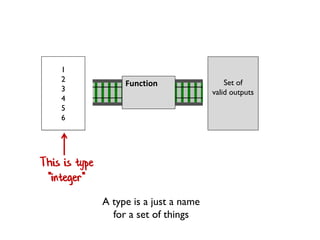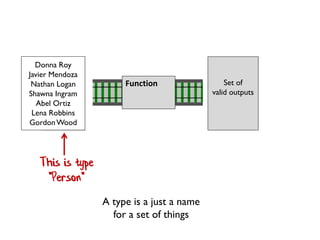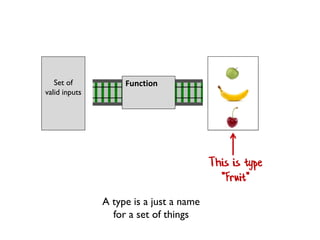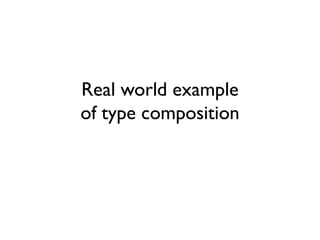F# for C# Programmers
- 1. F# for C# programmers @ScottWlaschin fsharpforfunandprofit.com
- 2. A language that doesn't affect the way you think about programming, is not worth knowing – Alan Perlis
- 3. “F# is slightly better than C#, but not so much that it's really worth the effort to move towards it.” “Learning F# was one of the biggest boosts in my career as a C# developer. I don't use it professionally (I wish I could) but this knowledge made me a better programmer.”
- 4. About F# • Developed by Microsoft Research – Shipped withVisual Studio in 2010 • Open source – On github • Cross platform – Works withVS Code (and other editors) • Very active and friendly community. – Start with fsharp.org – F# Slack channel – #fsharp onTwitter
- 5. A tour of F# • Differences between C# and F# – Concise syntax – Type inference – Different defaults – Different philosophy • Special to F# – Functional-first – Algebraic type system – Interactivity From least to most important!
- 6. SYNTAX
- 7. public class Person { public Person(string name, DateTime birthday) { _name = name; _birthday = birthday; } private readonly string _name; private readonly DateTime _birthday; public string Name { get { return _name; } } public DateTime Birthday { get { return _birthday; } } }
- 8. Syntax difference: Indentation instead of curly braces
- 9. public class Person { public Person(string name, DateTime birthday) { _name = name; _birthday = birthday; } private readonly string _name; private readonly DateTime _birthday; public string Name { get { return _name; } } public DateTime Birthday { get { return _birthday; } } } Do we really need the braces? The indentation already gives us all the clues we need.
- 10. public class Person { public Person(string name, DateTime birthday) { _name = name; _birthday = birthday; } private readonly string _name; private readonly DateTime _birthday; public string Name { get { return _name; } } public DateTime Birthday { get { return _birthday; } } } Example where braces indicate blocks
- 11. public class Person = public Person(string name, DateTime birthday) = _name = name; _birthday = birthday; private readonly string _name; private readonly DateTime _birthday; public string Name = get { return _name; } public DateTime Birthday = get { return _birthday; } Example where indentation indicates blocks Is it really that much harder to read?
- 12. public class Person = public Person(string name, DateTime birthday) = _name = name; _birthday = birthday; private readonly string _name; private readonly DateTime _birthday; public string Name = get { return _name; } public DateTime Birthday = get { return _birthday; } Use '=' to start blocks
- 13. public class Person = public Person(string name, DateTime birthday) = _name = name; _birthday = birthday; private readonly string _name; private readonly DateTime _birthday; public string Name = get { return _name; } public DateTime Birthday = get { return _birthday; } Shift up to use less vertical space
- 14. People who complain about using a language with syntactic whitespace People who have spent time using a language with syntactic whitespace "Oddly enough, Python's use of whitespace stopped feeling unnatural after about twenty minutes. I just indented code, pretty much as I would have done in a C program anyway, and it worked." - Eric Raymond HelpfulVenn Diagram Overlap
- 15. Syntax difference: Automatically create backing fields from constructor parameters
- 16. public class Person = public Person(string name, DateTime birthday) = _name = name; _birthday = birthday; private readonly string _name; private readonly DateTime _birthday; public string Name = get { return _name; } public DateTime Birthday = get { return _birthday; } A lot of duplication...
- 17. public class Person = public Person(string name, DateTime birthday) = ... public string Name = get { return name; } public DateTime Birthday = get { return birthday; } Use the constructor params directly
- 18. Syntax difference: Merge the primary constructor with the class definition
- 19. public class Person = public Person(string name, DateTime birthday) = ... public string Name = get { return name; } public DateTime Birthday = get { return birthday; } How often do you have more than one constructor?
- 20. public class Person(string name, DateTime birthday) = public string Name = get { return name; } public DateTime Birthday = get { return birthday; }
- 21. Syntax difference: Less syntax noise
- 22. public class Person(string name, DateTime birthday) = public string Name = get { return name; } public DateTime Birthday = get { return birthday; } So why use ‘get’? The class is immutable. Every property is "get" only.
- 23. public class Person(string name, DateTime birthday) = public string Name = return name; public DateTime Birthday = return birthday; 'get' is gone!
- 24. public class Person(string name, DateTime birthday) = public string Name = return name; public DateTime Birthday = return birthday; Who even likes typing semicolons anyway?
- 25. public class Person(string name, DateTime birthday) = public string Name = return name public DateTime Birthday = return birthday Semicolons gone!
- 26. Syntax difference: No “return” needed
- 27. public class Person(string name, DateTime birthday) = public string Name = return name public DateTime Birthday = return birthday
- 28. public class Person(string name, DateTime birthday) = public string Name = name public DateTime Birthday = birthday F# is an expression- oriented language
- 29. Difference: Members are public by default
- 30. public class Person(string name, DateTime birthday) = public string Name = name public DateTime Birthday = birthday
- 31. class Person(string name, DateTime birthday) = string Name = name DateTime Birthday = birthday
- 33. class Person(string name, DateTime birthday) = string Name = name DateTime Birthday = birthday Why do we have to repeat the type? Can't the compiler figure it out for us?
- 34. class Person(string name, DateTime birthday) = Name = name Birthday = birthday
- 35. class Person(string name, DateTime birthday) = member this.Name = name member this.Birthday = birthday
- 36. class Person(string name, DateTime birthday) = member this.Name = name member this.Birthday = birthday member this.Age() = var daysDiff = DateTime.Today.Subtract(birthday).Days daysDiff / 365
- 38. class Person(string name, DateTime birthday) = member this.Name = name member this.Birthday = birthday member this.Age() = var daysDiff = DateTime.Today.Subtract(birthday).Days daysDiff / 365
- 39. class Person(name: string, birthday: DateTime ) = member this.Name = name member this.Birthday = birthday member this.Age() = var daysDiff = DateTime.Today.Subtract(birthday).Days daysDiff / 365
- 41. class Person(name: string, birthday: DateTime ) = member this.Name = name member this.Birthday = birthday member this.Age() = var daysDiff = DateTime.Today.Subtract(birthday).Days daysDiff / 365
- 42. type Person(name: string, birthday: DateTime ) = member this.Name = name member this.Birthday = birthday member this.Age() = let daysDiff = DateTime.Today.Subtract(birthday).Days daysDiff / 365
- 43. Compared with modern C#
- 44. class Person(string name, DateTime birthday) { public string Name { get; } = name; public DateTime Birthday { get; } = birthday; public int Age() => DateTime.Today.Subtract(birthday).Days / 365; } Modern C# equivalent with auto-properties and expression-bodied members
- 46. type Person = { Name: string Birthday: DateTime } let age person = let daysDiff = DateTime.Today.Subtract(person.Birthday).Days daysDiff / 365
- 47. // age : Person -> int type Person = { Name: string Birthday: DateTime } let age person = let daysDiff = DateTime.Today.Subtract(person.Birthday).Days daysDiff / 365
- 48. Syntax is never the most important thing about a programming language. But…
- 49. Observation: 21 lines of code has shrunk to 5 lines of code
- 50. You see 3x more code on your screen!
- 51. public class Person { public Person(string name, DateTime birthday) { _name = name; _birthday = birthday; } private readonly string _name; private readonly DateTime _birthday; /// <summary> /// Full name /// </summary> public string Name { get { return _name; } } /// <summary> /// Birthday /// </summary> public DateTime Birthday { get { return _birthday; } } } public class Person(string name, DateTime birthday) = /// Full name public string Name = get { return name; } /// Birthday public DateTime Birthday = get { return birthday; } C# F# You write 1/3 as much code.
- 52. TYPE INFERENCE
- 53. Type inference let doSomething f x = let y = f (x + 1) "hello" + y
- 54. Type inference let doSomething f x = let y = f (x + 1) "hello" + y
- 55. Type inference let doSomething f x = let y = f (x + 1) "hello" + y Inferred type of doSomething : f:(int -> string) -> x:int -> string
- 56. Type inference // C# code public IEnumerable<IGrouping<TKey, TSource>> GroupBy<TSource, TKey>( IEnumerable<TSource> source, Func<TSource, TKey> keySelector ) { ... } // F# code let GroupBy source keySelector = ... Benefits of type inference: * Less typing * Less noise, more logic Here's a more complex example
- 58. F# has different defaults • Immutable by default – mutable is special case • Non-null types/classes by default – Nullable is special case • Structural equality by default – reference equality is special case • Everything must be initialized
- 60. Mutability let x = 1 x <- 2 // assign new value
- 61. Mutability let mutable x = 1 x <- 2 // assign new value
- 62. Not nullable by default
- 63. Non null type Person = { Name: string Birthday: DateTime } let x : Person = null
- 64. Non null [<AllowNullLiteralAttribute>] type Person(name: string, birthday: DateTime) = member this.Name = name member this.Birthday = birthday let x : Person = null
- 65. Structural equality by default (for record types)
- 66. Structural equality type Person = { Name: string Birthday: DateTime } let bday = DateTime(1980,1,1) let alice1 = {Name="Alice"; Birthday=bday} let alice2 = {Name="Alice"; Birthday=bday} alice1 = alice2 // true or false?
- 67. Everything must be initialized
- 68. Initialization type Person = { Name: string Birthday: DateTime } let alice : Person
- 69. Initialization type Person = { Name: string Birthday: DateTime } let alice = {Name="Alice"}
- 71. Different philosophies • C# historically comes from C-like approach. • F# comes from ML, a MetaLanguage for proving things.
- 72. Goal: Predictable code • Can you understand the code using only the information that you have right in front of you? • You’re not allowed to delve into other parts of the codebase!
- 73. Example 1 The answer is "hello world". What value is y? var x = 1; DoSomething(x); var y = "hello " + x;
- 74. Example 1 function DoSomething (foo) { x = "world"; } var x = 1; DoSomething(x); var y = "hello " + x;
- 75. Predictable code C# is more predictable than JavaScript! In C#, if you don't match up the types properly, you get a compile-time error not a run-time error. This is good!
- 76. How to make your language predictable: • Variables should not be allowed to change their type
- 77. Example 2 // create two customers var cust1 = new Customer(99, "J Smith"); var cust2 = new Customer(99, "J Smith"); // true or false? cust1 == cust2;
- 78. How to make your language predictable: • Variables should not be allowed to change their type • Objects with the same values should be equal by default.
- 79. Example 3 // create a customer and an order var cust = new Customer(99, "J Smith"); var order = new Order(99, "J Smith"); // true or false? cust.Equals(order);
- 80. How to make your language predictable: • Variables should not be allowed to change their type • Objects with the same values should be equal by default. • Comparing objects of different types is a compile- time error.
- 81. Example 4 // create a customer var cust = new Customer(); // what is the expected output? Console.WriteLine(cust.Address.Country)
- 82. How to make your language predictable: • Variables should not be allowed to change their type • Objects with the same values should be equal by default. • Comparing objects of different types is a compile-time error. • Objects must always be initialized to a valid state. Not doing so is a compile-time error.
- 83. Example 5 // create a customer var cust = new Customer(99, "J Smith"); // add it to a set var processedCustomers = new HashSet<Customer>(); processedCustomers.Add(cust); // process it ProcessCustomer(cust); // Is the customer still in the set? True or false? processedCustomers.Contains(cust); You can't tell! Not predictable! If ProcessCustomer mutates the customer, it might change the hash
- 84. Example 5 // create a customer var cust = new ImmutableCustomer(99, "J Smith"); // add it to a set var processedCustomers = new HashSet<ImmutableCustomer>(); processedCustomers.Add(cust); // process it and return the changes var changedCustomer = ProcessCustomer(cust); // Is the customer still in the set? True or false? processedCustomers.Contains(cust); Immutability forces changed values to be returned explictly. Original value unchanged.
- 85. How to make your language predictable: • Variables should not be allowed to change their type • Objects with the same values should be equal by default. • Comparing objects of different types is a compile-time error. • Objects must always be initialized to a valid state. Not doing so is a compile-time error. • Once created, objects and collections must be immutable.
- 86. Example 6 // create a repository var repo = new CustomerRepository(); // find a customer by id var customer = repo.GetById(42); // what is the expected output? Console.WriteLine(customer.Id); What happens if the customer is missing? Is the customer null or what? You can't tell! Not predictable!
- 87. Example 6 // create a repository var repo = new CustomerRepository(); // find a customer by id var customerOrError = repo.GetById(42); // handle both cases if (customerOrError.IsCustomer) Console.WriteLine(customerOrError.Customer.Id); if (customerOrError.IsError) Console.WriteLine(customerOrError.ErrorMessage); Instead, build error cases into the return type.
- 88. How to make your language predictable: • Variables should not be allowed to change their type • Objects with the same values should be equal by default. • Comparing objects of different types is a compile-time error. • Objects must always be initialized to a valid state. Not doing so is a compile-time error. • Once created, objects and collections must be immutable. • Missing data or errors must be made explicit. No nulls allowed.
- 89. F# aims to be a predictable language: • Variables are not be allowed to change their type • Objects with the same values are equal by default. • Comparing objects of different types is a compile-time error. • Objects must be initialized to a valid state. Not doing so is a compile-time error.. • Once created, objects and collections are (generally) immutable. • Missing data or errors are (generally) made explicit. Nulls are a code smell.
- 90. FUNCTIONAL FIRST
- 91. Core principles of functional programming Function Parameterize all the things Functions Composition everywhere
- 92. FP Principle: Functions are things Function
- 93. Functions as things The Tunnel of Transformation Function apple -> banana A function is a thing which transforms inputs to outputs
- 94. Functions as things let x = 1 let add x y = x + y
- 95. A function is a standalone thing, not attached to a class It can be used for inputs and outputs of other functions
- 96. input A function can be an output A function is a standalone thing, not attached to a class It can be used for inputs and outputs of other functions
- 97. output input A function can be an output A function can be an input A function is a standalone thing, not attached to a class It can be used for inputs and outputs of other functions
- 98. output input input output A function can be an output A function can be an input A function can be a parameter A function is a standalone thing, not attached to a class It can be used for inputs and outputs of other functions
- 99. output input input output A function can be an output A function can be an input A function can be a parameter A function is a standalone thing, not attached to a class It can be used for inputs and outputs of other functions From this simple foundation we can build complex systems
- 101. Function composition Function 1 apple -> banana Function 2 banana -> cherry
- 102. Function composition >> Function 1 apple -> banana Function 2 banana -> cherry
- 103. Function composition New Function apple -> cherry Can't tell it was built from smaller functions! Where did the banana go? (abstraction)
- 104. add1 double5 12 let add1 x = x + 1 let double x = x + x let add1_double = add1 >> double let x = add1_double 5 Composition (F#)
- 105. add1 double square5 144 let add1_double_square = add1 >> double >> square let x = add1_double_square 5 Composition (F#)
- 106. Func<int, int> add1 = x => x + 1; Func<int, int> doubl = x => x + x; Func<int, int> square = x => x * x; var composed = add1.Compose(doubl).Compose(square); composed(5); Composition (C#)
- 107. Piping (F#)
- 108. add1 5 // = 6 double (add1 5) // = 12 square (double (add1 5)) // = 144 5 |> add1 // = 6 5 |> add1 |> double // = 12 5 |> add1 |> double |> square // = 144 Standard way of nesting function calls can be confusing if too deep add1 double square5 6 12 144
- 109. Piping (C#)
- 110. 5.Pipe(Add1); // = 6 5.Pipe(Add1).Pipe(Double); // = 12 5.Pipe(Add1).Pipe(Double).Pipe(Square); Func<int, int> add1 = x => x + 1; Func<int, int> doubl = x => x + x; Func<int, int> square = x => x * x; add1 double square5 6 12 144
- 111. Why we say F# is "functional-first" • F# makes FP easy • C# makes FP possible – but it's awkward and not idiomatic
- 112. FP Guideline: Parameterize all the things
- 113. Parameterize all the things let printList() = for i in [1..10] do printfn "the number is %i" i
- 114. Parameterize all the things let printList aList = for i in aList do printfn "the number is %i" i
- 115. Parameterize all the things let printList anAction aList = for i in aList do anAction i FPers would parameterize the action as well: We've decoupled the behavior from the data. Any list, any action!
- 116. Parameterize all the things public static int Product(int n) { int product = 1; for (int i = 1; i <= n; i++) { product *= i; } return product; } public static int Sum(int n) { int sum = 0; for (int i = 1; i <= n; i++) { sum += i; } return sum; }
- 117. public static int Product(int n) { int product = 1; for (int i = 1; i <= n; i++) { product *= i; } return product; } public static int Sum(int n) { int sum = 0; for (int i = 1; i <= n; i++) { sum += i; } return sum; } Parameterize all the things
- 118. Parameterize all the things let fold action initialValue list = let mutable totalSoFar = initialValue for item in list do totalSoFar <- action totalSoFar item totalSoFar
- 119. Parameterize all the things let fold action initialValue list = let mutable totalSoFar = initialValue for item in list do totalSoFar <- action totalSoFar item totalSoFar
- 120. Parameterize all the things let product n = let initialValue = 1 let action productSoFar x = productSoFar * x [1..n] |> List.fold action initialValue let sum n = let initialValue = 0 let action sumSoFar x = sumSoFar+x [1..n] |> List.fold action initialValue Lots of collection functions like this: "fold", "map", "reduce", "collect", etc.
- 121. Big topic! Not enough time right now ! More at fsharpforfunandprofit.com/fppatterns
- 123. What are F# types? A type is not a class
- 124. What is a type? A type is a just a name for a set of things Set of valid inputs Set of valid outputs Function
- 125. Set of valid inputs Set of valid outputs Function 1 2 3 4 5 6 This is type "integer" A type is a just a name for a set of things
- 126. Set of valid inputs Set of valid outputs Function This is type "string" "abc" "but" "cobol" "double" "end" "float" A type is a just a name for a set of things
- 127. Set of valid inputs Set of valid outputs Function This is type "Person" Donna Roy Javier Mendoza Nathan Logan Shawna Ingram Abel Ortiz Lena Robbins GordonWood A type is a just a name for a set of things
- 128. Set of valid inputs Set of valid outputs Function This is type "Fruit" A type is a just a name for a set of things
- 129. Set of valid inputs Set of valid outputs Function This is a type containing functions A type is a just a name for a set of things
- 130. F# types can be composed "Algebraic type system"
- 132. New types are built from smaller types using: “AND” “OR”
- 133. Example: pairs, tuples, records FruitSalad = One each of and and “AND” types type FruitSalad = { Apple: AppleVariety Banana: BananaVariety Cherry: CherryVariety }
- 134. Snack = or or “OR” types type Snack = | Apple of AppleVariety | Banana of BananaVariety | Cherry of CherryVariety
- 135. Real world example of type composition
- 136. Example of some requirements: We accept three forms of payment: Cash, Check, or Card. For Cash we don't need any extra information For Checks we need a check number For Cards we need a card type and card number
- 137. interface IPaymentMethod {..} class Cash() : IPaymentMethod {..} class Check(int checkNo): IPaymentMethod {..} class Card(string cardType, string cardNo) : IPaymentMethod {..} In C# you would probably implement it as an interface and a set of subclasses, like this:
- 138. type CheckNumber = int type CardNumber = string In F# you would probably implement by composing types, like this
- 139. type CheckNumber = int type CardNumber = string type CardType = Visa | Mastercard type CreditCardInfo = CardType * CardNumber
- 140. type CheckNumber = int type CardNumber = string type CardType = Visa | Mastercard type CreditCardInfo = CardType * CardNumber type PaymentMethod = | Cash | Check of CheckNumber | Card of CreditCardInfo
- 141. type CheckNumber = int type CardNumber = string type CardType = Visa | Mastercard type CreditCardInfo = CardType * CardNumber type PaymentMethod = | Cash | Check of CheckNumber | Card of CreditCardInfo type PaymentAmount = decimal type Currency = EUR | USD
- 142. type CheckNumber = int type CardNumber = string type CardType = Visa | Mastercard type CreditCardInfo = CardType * CardNumber type PaymentMethod = | Cash | Check of CheckNumber | Card of CreditCardInfo type PaymentAmount = decimal type Currency = EUR | USD type Payment = { Amount : PaymentAmount Currency: Currency Method: PaymentMethod }
- 143. F# design principle: Types are executable documentation
- 144. type Deal = Deck –› (Deck * Card) type PickupCard = (Hand * Card) –› Hand Types are executable documentation type Suit = Club | Diamond | Spade | Heart type Rank = Two | Three | Four | Five | Six | Seven | Eight | Nine |Ten | Jack | Queen | King | Ace type Card = Suit * Rank type Hand = Card list type Deck = Card list type Player = {Name:string; Hand:Hand} type Game = {Deck:Deck; Players: Player list} The domain on one screen!
- 145. Types are executable documentation type CardType =Visa | Mastercard type CardNumber = CardNumber of string type CheckNumber = CheckNumber of int type PaymentMethod = | Cash | Check of CheckNumber | Card of CardType * CardNumber
- 146. Another big topic and not enough time More on DDD and designing with types at fsharpforfunandprofit.com/ddd
- 147. INTERACTIVITY
- 148. Interactivity demo
- 149. Slides and video here F# consulting fsharpforfunandprofit.com/csharp F# for C# programmers





























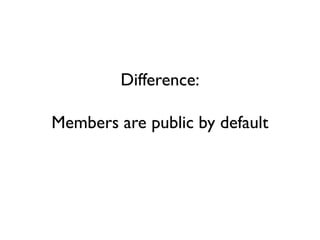




























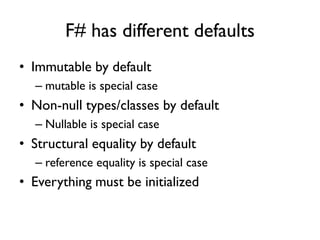





![Non null
[<AllowNullLiteralAttribute>]
type Person(name: string, birthday: DateTime) =
member this.Name = name
member this.Birthday = birthday
let x : Person = null](https://image.slidesharecdn.com/fsharp-for-csharp-programmers-170623214854/85/F-for-C-Programmers-64-320.jpg)










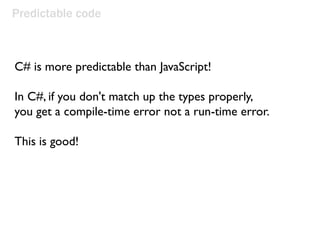








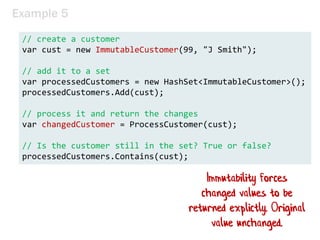


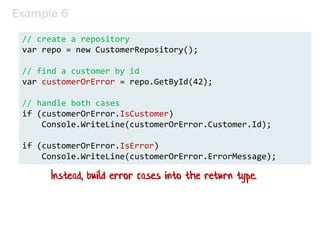

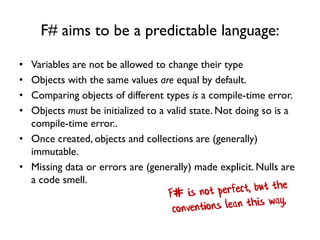























![Parameterize all the things
let printList() =
for i in [1..10] do
printfn "the number is %i" i](https://image.slidesharecdn.com/fsharp-for-csharp-programmers-170623214854/85/F-for-C-Programmers-113-320.jpg)

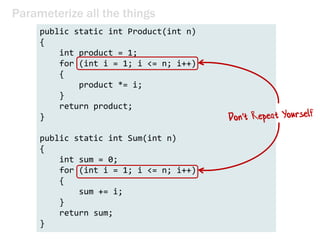

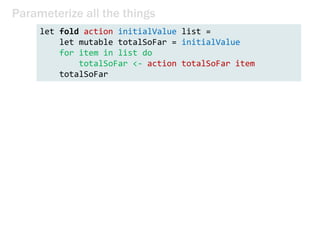


![Parameterize all the things
let product n =
let initialValue = 1
let action productSoFar x = productSoFar * x
[1..n] |> List.fold action initialValue
let sum n =
let initialValue = 0
let action sumSoFar x = sumSoFar+x
[1..n] |> List.fold action initialValue
Lots of collection functions like this:
"fold", "map", "reduce", "collect", etc.](https://image.slidesharecdn.com/fsharp-for-csharp-programmers-170623214854/85/F-for-C-Programmers-120-320.jpg)



